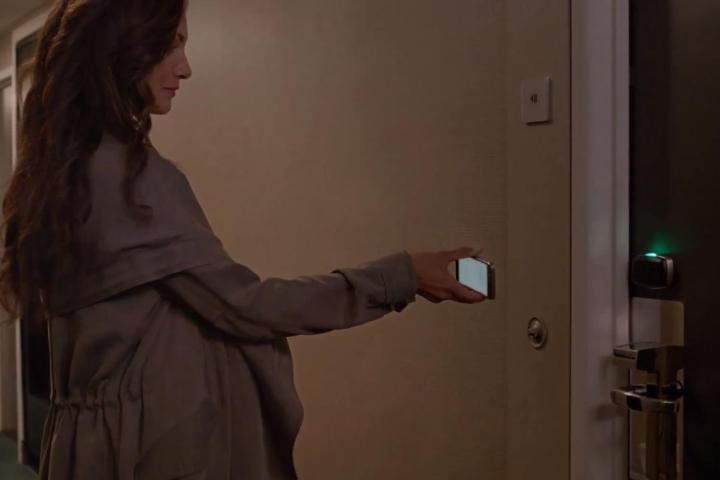
Detailed by the Wall Street Journal, Starwood Hotels & Resorts is transitioning to a keyless entry system at two locations in the United States. Rolling out first at Aloft Hotel locations in New York City and Silicon Valley, guests of the hotel can download a mobile application to their smartphone before arriving. Rather than visiting the front desk to check into their room, the guest simply checks-in through the app and can go directly to their hotel room for the night.
At the door, the guest pulls up a virtual key on the smartphone and unlocks the door by either tapping or turning the phone in a twist motion near the handle. Utilizing low power Bluetooth technology, the smartphone communicates with a sensor mounted to the door and unlocks the room. According to the developer of the application, the application should work with smartphones running Android 4.3 or higher as well as the iPhone 4S and higher.
Since the locks are battery powered, it doesn’t matter if the power is out at the hotel. Guests will still be able to access their rooms without requiring a physical card key. Regarding battery life within the door units, the hotel staff will receive alerts when battery power is running low, thus allowing easy replacement.
When asked about the technology upgrade to the Aloft hotels, Starwood CEO Frits van Paasschen said “We believe this will become the new standard for how people will want to enter a hotel. It may be a novelty at first, but we think it will become table stakes for managing a hotel.” Assuming the pilot program is successful at the two Aloft locations, Starwood management plans to upgrade door locks at all 123 Aloft and W hotels locations by the end of 2015.
Prior to this point, Starwood created a system in which loyalty members would receive a key card prior to checking into the hotel. Basically, the card would be activated once the guest arrived at the hotel and the card could be reused when returning to another Aloft location. Alternatively, hotel chains like Marriot and InterContinental have rolled out a mobile check-in process for loyalty members, but still require guests to interact with someone at a desk prior to checking into their room.
Interestingly, the owner of the Holiday Inn chain tried out a pilot program that provided self-service kiosks for checking into hotel rooms, but guests ignored the kiosks and went to the front desk instead. According to Holiday Inn management, guests at those hotels wanted to speak to someone at the front desk in order to request specific features for the room. However, it would be relatively simple to program those choices into the kiosk software and offer upgrades for a nominal fee.
When leaving the hotel, it’s likely that guests will simply be able to check out utilizing the same mobile application provided by Starwood. Hypothetically, the app could also allow guests to review all room charges during the stay as well as take advantage of hotel features like room service.
Editors' Recommendations
- Your $1,000 smartphone is a bad deal. These cheap phones prove it
- The best touchscreen gloves for your smartphone


